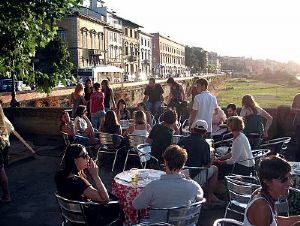The European Union (EU) is in the throngs of its most serious crisis since its establishment: an economic arrangement that was meant to keep war unthinkable threatens to tear it apart. On May 9 and 10, Europe’s leading academics, policy makers, and business leaders gathered in Salone dei Cinquecento of Palazzo Vecchio to celebrate the EU’s past and debate its future during one of the most challenging moments.
The second annual State of the Union conference was organized by the European University Institute (EUI). One of the most important and prestigious EU-related research institutions in Europe, the EUI was established to ‘foster the advancement of learning in fields which are of particular interest for the development of Europe.’ Situated in the hills of Fiesole, the EUI’s proximity to Florence signals the Renaissance city’s continued role as a place for enlightened political thinking. Italian prime minister Mario Monti, president of the European Commission José Manuel Durão Barroso and a number of EU officials were among the conference’s speakers.
The opening day of the conference fell on the 62nd anniversary of the Schuman Declaration, a proposal by former French foreign minister Robert Schuman in 1950 for a post-war supranational organization that has evolved into the present-day EU. The anniversary is now celebrated every May 9 as Europe Day (see TF 141) with events across the EU commemorating the tremendous progress that has been made since 1945. But the seriousness of the debt crisis and the growing social and political unrest in EU countries overshadowed much of the day that was meant for celebration.
President Barroso stated that, despite the crisis, he is confident Europe will prevail. ‘When you compare Europe today with the situation of Europe 62 years ago, I think we can be proud; the EC was then only 6 countries, now we are 27, and very soon will be 28. Most of what is today the EU was living under dictatorships and totalitarian regimes and now we are living in freedom and peace, so let’s put things in perspective,’ President Barroso reassured the audience. In a post-conference interview, the mayor of Florence, Matteo Renzi, sang a similar tune and advocated for a stronger EU: ‘Europe is not the problem, Europe is the solution.’ He added that ‘Italian families need more euro in their wallets, but the only way to have more euro in their wallets is to have more Europe.’
Other panelists, such as Barry Eichengreen of University of California Berkeley, believed that more should be done to secure Europe’s future, but considered the conference a constructive venue to attempt to tackle some of Europe’s most pressing economic and institutional issues. ‘There is still a lack of urgency in the European response to the crisis…there is no sense that Europe is facing a crisis,’ he said.
In a keynote speech on May 9, Monti, focused on the issue of the day: economic growth. He called for ‘growth in general and growth in Europe.’ Economic growth is ‘badly needed,’ he reiterated. ‘We don’t have to invent anything but we need to put better harmony in the instruments of the EU that are already there to ensure that there is budgetary discipline in member states, with some European initiatives which could bring new impetus to growth.’
This emphasis on growth represents a shift in the discourse that has been so heavily focused on fiscal rigor. At the forefront of Monti’s recovery plan for Italy and renewed stability in the eurozone has been a reduction in ‘abnormal’ government spending with a consolidation of the budget (see TF 163). But the people of Italy are still suffering from economic turmoil and euro-skepticism is on the rise. In the wake of a string of highly publicized suicides, an increase in unemployment levels and businesses that continue to struggle, social tensions have deepened. The percentage of Italians worried about the economy has risen since January 2012, from 67 to 83 percent, almost double the percentage in 2008. Furthermore, only 7 percent believe that the situation will improve in the next year (Source: Demopolis public opinion data, May 12, 2012).
Monti’s address at the State of the Union echoed what leaders across the EU have been calling for in recent weeks. Since the election of Socialist presidential candidate François Hollande in France and the failure of elections in Greece, many have wondered what the future of the Union’s current austerity measures will be. Seventy-eight percent of Italians consider the results of the recent French and Greek elections a mandate to change the EU’s current economic policies of austerity. Moreover, Reuter’s has reported that Monti’s approval ratings have dropped 6 percentage points in recent weeks.
A few days after the State of the Union in Florence, Monti was in Arezzo during Pope Benedict XVI’s visit to southern Tuscany. There he addressed citizens’ concerns about the economic crisis. He said that despite ‘serious signs of fracture in social cohesion’ and threats of Greece’s departure from the EU, ‘Europe is still the model.’ The economic crisis must be tackled with ‘courage and conviction’ so that Europe can move forward from this crisis, he added.
A new EU ‘growth pact’ is the latest solution on the table. Such a pact would, in theory, complement the most recent ‘fiscal compact’ (decided in December 2011) by creating initiatives for greater investment in education and programs that help businesses and create jobs. In particular, France’s new president advocates more funding for the European Investment Bank and his campaign platform has proposed measures in France that would create more than 60,000 new teaching positions and other state-aided jobs.
There is no single solution for Europe’s continued problems. Any new course of action must strike a balance between fiscal discipline, programs for growth and structural reform. While the makeup and terms of such a ‘growth pact’ for Europe have yet to be finalized, it is clear that urgent action must be taken to calm financial markets and improve the dismal state of the Union.






